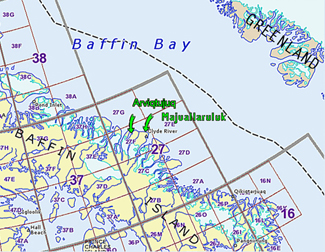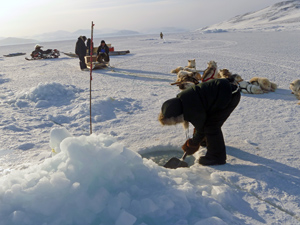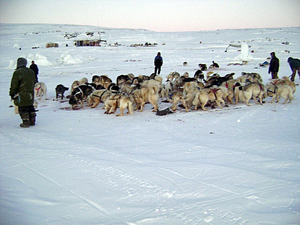Editorial: Know the Dog, the Land and the People
Fan Mail
Chinook Project Returns to Labrador
Canadian Animal Assistance Team Returns to Baker Lake
Ghosts of Dogs Past
A Conversation with
Charlotte DeWolff of Piksuk Media and
Jake Gearheard of the Ilisaqsivik Society
Qimmivut: the Ilisaqsivik Society’s Dog Team Workshop
Media Review: Of Ice and Men (book)
IMHO: Succession
Navigating This Site
Index of articles by subject
Index of back issues by volume number
Search The Fan Hitch
Articles to download and print
Ordering Ken MacRury's Thesis
Our comprehensive list of resources
Talk to The Fan Hitch
The Fan Hitch home page
ISDI home page
Editor's/Publisher's Statement
Editor: Sue Hamilton
Webmaster: Mark Hamilton
The Fan Hitch, Journal of
the Inuit Sled Dog, is published four times
a year. It is available at no cost online
at: https://thefanhitch.org.
The Fan Hitch welcomes your letters, stories, comments and suggestions. The editorial staff reserves the right to edit submissions used for publication.
Contents of The Fan Hitch are protected by international copyright laws. No photo, drawing or text may be reproduced in any form without written consent. Webmasters please note: written consent is necessary before linking this site to yours! Please forward requests to Sue Hamilton, 55 Town Line Rd., Harwinton, Connecticut 06791, USA or mail@thefanhitch.org.
This site is dedicated to the Inuit Dog as well as related Inuit culture and traditions. It is also home to The Fan Hitch, Journal of the Inuit Sled Dog.
The Fan Hitch welcomes your letters, stories, comments and suggestions. The editorial staff reserves the right to edit submissions used for publication.
Contents of The Fan Hitch are protected by international copyright laws. No photo, drawing or text may be reproduced in any form without written consent. Webmasters please note: written consent is necessary before linking this site to yours! Please forward requests to Sue Hamilton, 55 Town Line Rd., Harwinton, Connecticut 06791, USA or mail@thefanhitch.org.
This site is dedicated to the Inuit Dog as well as related Inuit culture and traditions. It is also home to The Fan Hitch, Journal of the Inuit Sled Dog.

Natural Resources Canada
Qimmivut - Our Dogs
The Dog Team Workshop of the Ilisaqsivik Society of Clyde River, Nunavut, Canada
by Jake Gearheared
For four weeks at the end of February 2011, the Ilisaqsivik Society* organized a land-based cultural workshop and community hunt by dog team to Arviqtujuq and Majuallaruluk, traditional camps of historical and cultural importance to Kangiqtugaapingmiut - the people of Kanngiqtugaapik (Clyde River). Workshop participants included six mushers/instructors each with one or two youth apprentices, one musher/instructor/workshop coordinator and seven skidoo support drivers/instructors. Approximately 20 youth participated during the entire four weeks. Seven youth participants rotated through the workshop for one or two weeks at a time. Some mushers got new youth every week. Other mushers stayed with the same youth the whole time. The mushers, skidoo drivers and coordinators often changed over the course of the workshop, usually depending on the length of the workshop.
The purpose of the Qimmivut workshop is to provide an opportunity for participants to share cultural skills, knowledge and values. The workshop promotes mental, spiritual and physical well-being, and validates and transfers Inuit Qaujimajatuqangit (IQ) - the body of knowledge and unique cultural insights of Inuit into the workings of nature, humans and animals; closer to Inuit ways of thinking and being - associated with Inuit societal values, hunting, traveling, working with dogs, camping, and being on the land.
This is an annual workshop that Ilisaqsivik has been organizing for the past five years. The workshop allows youth and young adults to be out on the land with recognized hunters, dog team owners and Elders. The purpose of this trip is to reaffirm and teach IQ, as well as promote the development of mentoring relationships between Elders, adults and youth. Traveling by dog team provides an excellent opportunity to transfer IQ around practical navigation, travel, camping, tool making and harvesting skills, as well as social values related to principals that include:
- Avatimik Kamattiarniq/Qanuqtuurniq - the concept of environmental stewardship/finding the balance;
- Pijitsirarniq - the concept of serving;
- Pilimmaksarniq - the passing on of knowledge and skills through observation, doing and practice;
- Piliriqatigiingniq/Aajiiqatigiingniq - the concept of collaborative working relationships or working together for a common purpose/the Inuit way of decision-making, comparing views or taking counsel.

Checking the seal net. photo: David Iqaqrialu
Workshop time is planned each day of the trip. The group stays in cabins at Arviqtujuq and Majuallaruluk providing a space to meet in the evenings and talk. Workshop time also occurs outside, through group discussions on the land or ice and, most importantly, through direct, hands on experiences.
The following is a list of topics that were addressed during the workshop:
- Caring for and working with dogs, as well as the significance and history of dogs in Inuit culture and traditional livelihoods
· Commands
· Caring for and feeding dogs
· History of dogs in our community
· Social, economic, and cultural significance of dogs
· How to make harnesses, leads, whips and backpacks
· Caring for and feeding dogs
· History of dogs in our community
· Social, economic, and cultural significance of dogs
· How to make harnesses, leads, whips and backpacks
- Safe winter travel and camping skills
- Social Values
· Relationship with
the land
· Relationship between oneself and social group
· Value of hard work and team work
· Respect for each other
· Respect for oneself
· Relationship between oneself and social group
· Value of hard work and team work
· Respect for each other
· Respect for oneself
- Traditional Inuktitut words and phrases related to traveling and working with dogs, and other skills and social values addressed during the trip.

|
Dog team
instructors teach youth apprentices to feed
their dogs off the chain. Feeding in
this manner allows the dogs to work out
aggression and small conflicts and establish a
strong hierarchy which helps promote better
teamwork and avoid big fights in the future.
photo:
Ilisaqsivik Society |
*Incorporated in 1997, Ilisaqsivik Society is a non-profit, community-based Inuit organization in Clyde River, Nunavut, Canada dedicated to promoting community wellness in ways that maintain respect for traditional Inuit teachings and learning, and are accountable to the community. Ilisaqsivik offers a wide range of community-based programs that support the physical, mental, emotional and spiritual needs of all community residents from infants to Elders. For more information about Ilisaqsivik or the Qimmivut workshops please contact Jakob Gearheard, Executive Director, Ilisaqsivik Society/Ittaq Heritage and Research Centre, P.O. Box 150, Clyde River, NU X0A0E0 or coordinator@ilisaqsivik.ca.